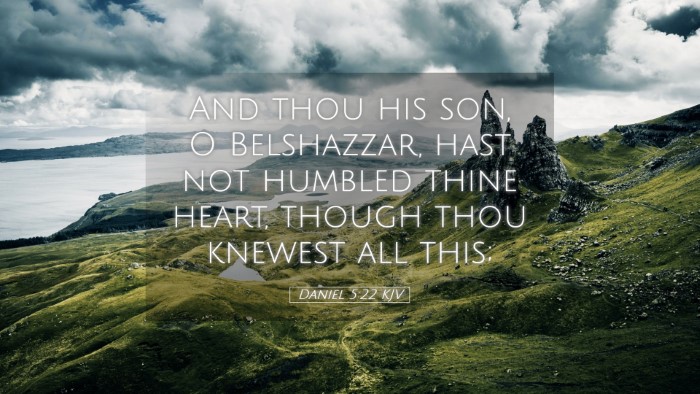Commentary on Daniel 5:22
Verse Reference: Daniel 5:22 (KJV): "And thou his son, O Belshazzar, hast not humbled thine heart, though thou knewest all this."
Context and Background
The chapter of Daniel 5 presents an enthralling narrative of the fall of Babylon. Belshazzar, son of Nebuchadnezzar, holds a feast and, in an act of profound arrogance, uses vessels that were taken from the Jerusalem temple. This desecration sets the stage for a divine judgment delivered through a mysterious hand writing upon the wall. This verse connects directly to Belshazzar's failure to learn from the history of his father's reign and the ultimate sovereignty of God.
Exegesis of the Verse
This verse serves as a critical point at which Daniel rebukes Belshazzar. Matthew Henry elaborates on this by noting that Belshazzar, despite having the precedent of Nebuchadnezzar's fall due to pride, did not humble his heart. His ignorance of history, according to Henry, demonstrates not a lack of knowledge, but a wilful rejection of it. Daniel’s address to Belshazzar implies that he understood the lessons of his father’s reign yet chose to ignore them.
Key Themes
- The Importance of Humility: Daniel underscores the necessity of humility before God. Humility is a recurring theme in scripture, observed as a vital disposition for receiving divine favor.
- Knowledge and Responsibility: The verse suggests that knowing God's works obligates an individual to respond appropriately. Barnes mentions that Belshazzar was aware of the fate of his father but still acted pridefully.
- Divine Judgment: The consequences of pride are starkly illuminated in this passage. Clarke points out that those in authority, like Belshazzar, face greater accountability before God for their actions.
Theological Implications
The implications of this verse extend well beyond historical narrative to rich theological reflection. Belshazzar’s failure is a reminder for every leader and believer of the dire consequences of pride and unrepentant sin. Matthew Henry emphasizes that when God has shown mercy in the past, we must respond with gratitude and reverent fear. Failing to do so leads to dire consequences, as seen in the immediate divine judgment that follows in the chapter.
Pastoral Applications
- Call to Reflection: Pastors can use this verse as a call for congregants to reflect on their own lives. Are there areas where pride has taken root?
- Emphasizing Accountability: Teachings based on this verse can stress the importance of accountability, particularly in leadership roles, reminding leaders that their actions can lead others astray.
- Encouragement to Repentance: The possibility of turning back to God in humility can be stressed as the antidote to the pride that leads to destruction.
Conclusion
Daniel 5:22 encapsulates a vital truth that resonates throughout scripture: the necessity of humility before God and the dangers of pride. Belshazzar's tragic end serves as a lesson for leaders and believers alike. As scholars and students engage with this text, may they find both caution in its warning and encouragement in the call to humility. Reflecting on this verse challenges us not only to remember the lessons of history but also to apply them actively in our lives.


